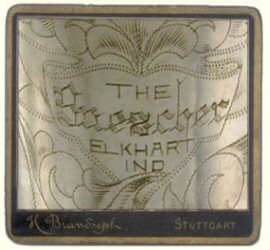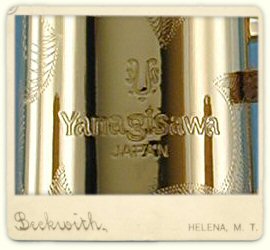One topic I wrestle with is how to run great rehearsals. This is a really personal topic for me. Why? I have been "out of" the music instruction scene for the past 9 years. So, I feel a bit affected by the "use it or loose it" concept. To harness the positive, I feel this gives me a great opportunity to capitalize on what I can learn from making a come back from my hiatus. Added to that, I do think running great rehearsals also involved group dynamics and personal relationships among the members. For a quartet this is especially critical.
So, combining a personal mission to make our rehearsal value as high as possible with acknowledgment that our group dynamic and individual personalities add greatly to our success, I've started to put some thoughts into how we work so well, what we are trying to accomplish and how and where we go from here. Since no group exists for, or on, the desire of just one member, I know my fellow members will have something to add.
First, some group history. If you don't know, Judy and I are married. Her twin sister, Janet is our Bari player. BJ, well, he is not related in a familial sense. However, BJ and Judy have played together for a few years before BJ filled Judy's teaching position after her retirement. So he for sure is a member of our family. (We charge him very little for continued "membership"). With our family tree now firmly in mind, I think the path is clear to jump right in.
In my quest to find information about group rehearsal techniques, I have found little. I would have expected to find tons of how to's or "here is what we do" messages. But, I have not. I think it must be a secret or something. Or is running a great rehearsal just supposed to be an assumed skill for all groups? I tend to think neither is the case. I just think we have not had the ability to share thoughts on this subject easily. Today - no excuses. Blogging is a great way to get thoughts on 'paper' and out to others.
So, here are my thoughts on holding and benefiting from really great rehearsal techniques. KSQ is getting better every day. Being the goal setting type, I know some of the items on my list are skills our group has in plenty. Others, are stretch goals for us - ones we will certainly work hard to improve. As we do, I will keep this post topic updated.
1.) Communicate -- all kinds works best. Talk about the upcoming rehearsal, what you want to accomplish, where it will be held, what pieces you will cover, what pieces you will not work on, tempo updates, recordings to listen to prior, clothes to wear (oh -- that is just for Judy and Janet), plan meals -- our rehearsals are often long and span 1 meal or more. We have found that the things that make great rehearsals is making them memorable and fun. While we all remember the days of scheduled rehearsals just barely fitting into our day, we consider our group our opportunity to be in total control of how much we enjoy rehearsals. We talk them up, make events out of them to whatever degree makes sense, not going overboard, and enjoying the prep and planning as part of the lead in to the actual event.
2.) Generating Urgency -- ok, this is straight out of a Leadership workshop I am building, but it fits. KSQ has gotten better because we have created URGENCY in our group. How have we done that? We didn't wait for performances to come to us. We went out and told others we were performing. We have not been turned down. And, thus, these 'urgencies' have led to a NEED to rehearse. I think we are very good at knowing what we are rehearsing for. We always have an event that we are prepping for. We make that a driver for our rehearsals. I don't think this is an obvious approach. In my early years, prepping for a concert band concert that was months away never seemed to be the priority. I am not a fan of rehearsing for rehearsal sake. Call it old age or impatiences or over exuberant goal setting. Now-a-days, I need a sense of URGENCY, and I think our group has really benefited from that approach.
3.) Coaching -- this topic served as a really great thought partnering activity between Judy and I the other night. I asked a simple question - "Who leads our group?" For about an hour we shared past experiences with other groups, how they worked together, what the outcome of their work was (ie -- how good were these groups), and discussions on group dynamics, not the musical dynamics but the interrelationships in the group. I have been thinking that our group could use a coach to help us get to the next level. I had in my mind that the group could only get to the next level if we had someone telling us what to do and how to do it. Considering the picture I painted above of my past group rehearsal experiences - ie -- they were schedule, repetitive, not so fun, my coaching idea created a real double talk situation for myself. What was I saying? Did I really think a coaching environment fit into the culture of our group? After consideration, I've realized that what we have been doing is starting to develop our own internal coaching skills as a group. We haven't reach or even defined our own model yet, but we are opening up. We all have a ton of respect for each other. We all hear things in our own way, beneficial ways to helping the group move forward musically. The more we play together, the more we are discovering what bugs each of us more. Interestingly, we have started to "predict" what will be caught by someone else. I know if I miss an accidental more than once, Judy will politely hand me a pencil and say "MARK IT!". Since BJ and I play the Bb Instruments, we are more so now than in the early days listening to our "D's" and "Eb's" knowing that our instruments handle each differently, and thus cause intonation issues. These are small coaching efforts that we do for each other, sometimes non-verbally, sometimes verbally. While we have not actually spoken about this in our group (at least not up until now), I do think our next step is the development of internal musical coaching beyond what we are doing for each other now. Discussing the topic is the first step, one that I am glad to create here and for expansion on when we rehearse for our own betterment.
If you were expecting a "do this", "don't do this" checklist, sorry. My mind doesn't work like that. But, I am a single voice in our quartet. I know my fellow members will contribute their thoughts in time. For now, my advice to all is to
Communicate,
Create your own Urgency, and
Coach each other to better success. Give these simple challenges a try!
Mark
 If you are so inclined to download at 280MB of this single video, it took me about 15 minutes on cable in the early am. In the end, I now have a great clip to watch when I want to.
If you are so inclined to download at 280MB of this single video, it took me about 15 minutes on cable in the early am. In the end, I now have a great clip to watch when I want to.




